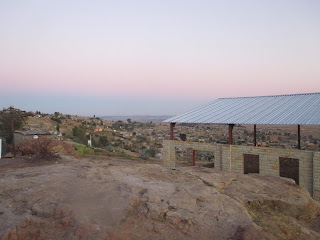Tell us one thing that is different about Lesotho, we said to our children. We were sitting in the dim evening light in the small classroom that was our home for the week. The paint on the walls was peeling, the floor bare, cracked concrete. There was a partition made of raw, untreated plywood, a badly fitting door, and a creaky old security gate between us and the dusty, rocky landscape outside. The teacher had kindly moved his piles of papers and books into corners to make space for us. We sat on the floor, on the pile of mattresses and sleeping bags that took up most of the space.
Our team had been in Teyateyaneng a little over a day, guests of Calvary Hope of the Nations Church for a week-long visit. We had all been restless the night before, disturbed by the preparations being made outside for a feast that was happening at the church the next day. There was talking and rustling movement all night, as women prepared great tubs of meat and cooked it in a huge pot over a fire a few metres from our door. We had woken to the smell of mutton, to people all over the place dressed in their finest, ready for the church service and the celebration that was to follow afterwards. Our kids went to church in a great striped tent for the first time, and heard the shrill, ear-splitting blasts of whistles blown by eager worshipers during the singing.
One different thing: for me, taking care of my family and helping to feed the team of young people we had traveled with, one very different thing was the water situation. There was one tap outside, and one in the kitchen. I carried water and sent my kids to the tap countless times with a five-litre plastic bottle to fetch water for hand washing and cup rinsing, for our baths in a plastic tub, and later in the week, to wash underwear and T-shirts when we needed them. And when the water was dirty, I carried it on my hip to a small sloped patch of ground and threw it away. No drains. That was my one thing.
The older children said it was different not having a real toilet, only a line of long-drops used by the church and the school. The language was different, the weather was different, there were few tarred streets. But our youngest, about to turn seven, answered without hesitation. By the evening of the first day all the local children knew his name, and he spent most of his time surrounded by children who appeared from every door in the scattering of homes around the church and followed him, pied-piper style, over the uneven, rocky landscape. There are no walls, he said, wide-eyed, thinking probably of the electric fences and automatic gates we have at home. Lesotho has no walls.
As the week progressed, we learnt just what that meant. No walls meant community. It meant children at our door, wanting to play, before we had even woken up. It meant a whole village turning up for a church celebration. It meant more children than we could manage for the daily puppet show, Bible lesson and games we brought, without a single flyer or advertisement. It meant a crowd for evening screenings of the Jesus film. It meant warm welcomes into stranger's homes to share our faith.
Of course there are walls in Lesotho, walls that my small son cannot see. For the smart high school student who translated our puppet shows into Sesotho, there are tall walls to climb before he can realize his dream of studying law at university. His widowed dressmaker mother, raising her sister's children as well as her own, faces barriers to the health and happiness of her family every day. The pastor of the church cannot pay his staff what they need to live. The work of the church and the school is frustrated by poverty and unemployment, although God's spirit still moves powerfully, changing hearts and lives, unhindered by such human obstacles.
Lesotho blessed us, for the week that we were there. The experience was invaluable for our family, and a necessary one for me to finish Alex on the Edge. Back now behind our walls, I remember the expanse of hills we could see from the big rock overlooking the unfinished church building. Alex, although he exists only in my imagination, found a new perspective in this different landscape, in an unexpected step away from his ordinary life. I think that our family did too.
Lesotho
(A poem from Alex on the Edge)
Snowy peaks and icy
skies
Hills bursting folds of
green
Lines and lines of
flapping clothes
With houses in between
Huts of stone, walls of
brick
And little shacks of tin
Thank you, land within a
land
For welcoming me in







Enjoyable to read and very evocative of the village.
ReplyDelete